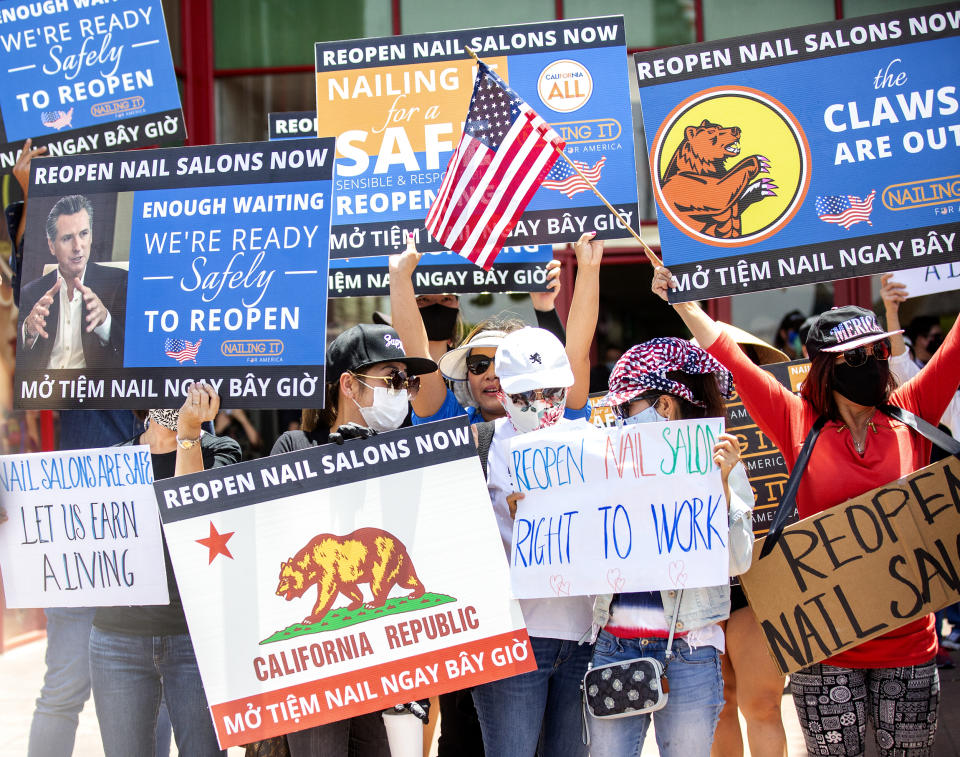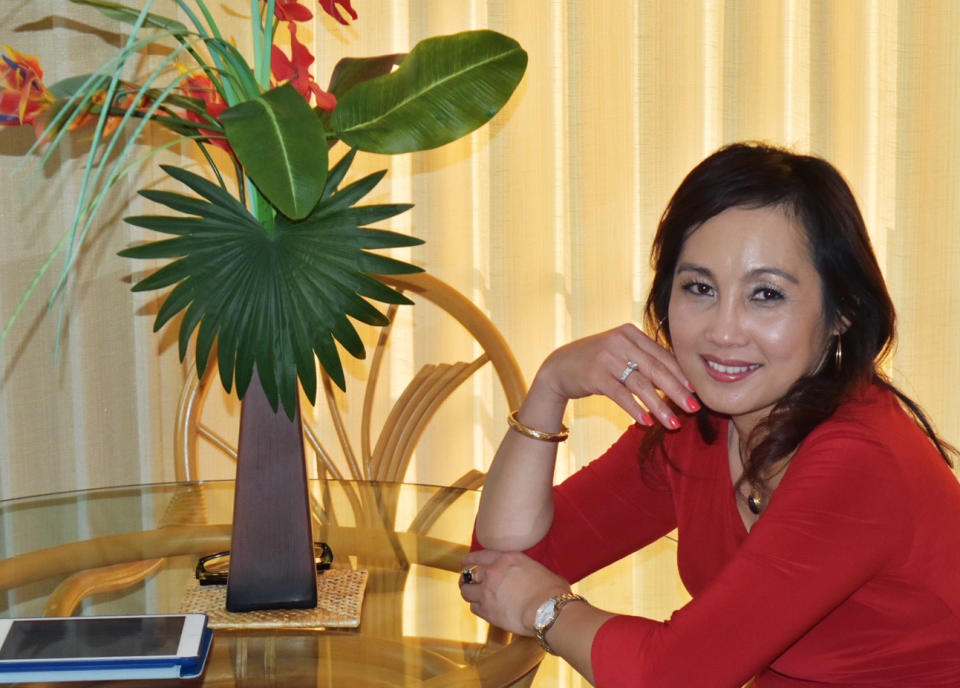Reopened, but left behind: Nail salon workers face hardships of virus and racism
When Kathy Pham immigrated from Saigon, Vietnam, to San Rafael, California, in 1989, she was 18 years old and searching for opportunity.
To make a living, Pham turned to a line of work a lot of other first- and second-generation Vietnamese women in California find themselves in: the nail salon industry. She enrolled in cosmetology school and has been painting nails ever since.
Doing manicures and pedicures didn't pay much, and the job came with more than its fair share of headaches, like long hours, rude customers and toxic chemicals, but Pham liked it well enough. She even grew to enjoy it, eventually ending up at a salon with great colleagues and "customers that treat us like family." Pham, a single mom, was clocking in seven days a week to support herself and her three kids.
Then the coronavirus pandemic struck, putting Pham out of work.
"Right now, I can't do anything," she said in an interview.
Full coverage of the coronavirus outbreak
Pham has been jobless for more than five months. And since the federal CARES Act expired July 25, her unemployment benefits have been cut to only about $100 a week, she said — hardly enough to get by.
Nail salon closings, and the resulting lost wages, have been particularly hard on Vietnamese women like Pham, who are the backbone of the industry. According to a study by the UCLA Labor Center and the California Healthy Nail Salon Collaborative, the U.S. nail salon workforce is 81 percent women and 79 percent foreign-born. Of immigrant manicurists, about three-quarters are from Vietnam. Many started coming to the U.S. as refugees after the war, seeking work in a field that didn't require much English.
The nail salon industry is especially important to the livelihood of the Vietnamese community in California, where 39 percent of Vietnamese immigrants in the U.S. live, according to the Migration Policy Institute. Nearly a sixth of all manicurists in the U.S. are concentrated in California.
"The economic burden of this shutdown has largely befallen women and people of color," State Assembly member Ash Kalra wrote in a letter to Gov. Gavin Newsom dated Aug. 28. "[S]ince the closures, three quarters of workers expressed doubt that they will be able to afford food and other necessities in the next month."
Left behind in reopening
In the letter, Kalra, whose district covers parts of eastern San Jose, calls for the safe reopening of salons and a reconsideration of current guidelines, which stipulate that a nail salon is allowed to operate indoors if it's in a county that has a low transmission rate, according to the state's new four-tier system. But if a county has a high transmission rate — which is determined by the number of new cases per 100,000 residents and test positivity rates — the salon must operate outdoors.
While such operations have been permitted since late July, salon owners and employees say outdoor setups require resources most businesses simply don't have. Not only do they present challenges in connecting manicure stations and foot spas to electricity, they say, but they also mean risking exposure to unmasked passersby, struggling to sanitize spaces subject to the elements and laboring in extreme heat and, because of California's wildfires, poor air quality.
The rule also applies to other personal care services, like body waxing, as well as fitness centers, restaurants and places of worship. But other industries, like hotels and casinos, are allowed to operate indoors, whether they are in high transmission counties or not.
That's not fair, argue nail salon advocates, who say manicurists are some of the most stringently hygienically trained workers in the service sector. "We demand to open safely indoors. We demand to open immediately," said Tam Nguyen, co-founder of Nailing It for America, which organized a protest in June. "We've done everything possible to deserve it."

Notably, nail salons were left out of the governor's reopening plans even as hair salons were given the go-ahead, which sent a confusing message to the industry, Nguyen said. "It was very puzzling and very hurtful," especially after the same community had banded together in April to donate more than 1.2 million pieces of personal protective equipment to medical professionals.
It also stung, Vietnamese manicurists said, when the governor made repeated but so far unsubstantiated claims that California's first case of community transmission happened in a nail salon. The assertion caused them to worry about not only the racist backlash it might spark — the group Stop AAPI Hate has tallied more than 2,500 reports of anti-Asian discrimination since March — but also the long-term effects on their livelihoods.
"How devastating as an industry for him to say that without any clear data, without any clear science," Nguyen said. "It rocked consumer confidence." (The governor's office didn't respond to requests for comment.)
A majority of California is in the most restrictive tier, including Orange, Santa Clara and Los Angeles counties, home to the three largest Vietnamese populations in the state — leaving most nail salons closed. That's true, as well, of Pham's home, Marin County, and she is stuck wondering when, or whether, her job will resume.
She's tried to find work at other salons, but to no avail. And the longer she goes without work or adequate unemployment benefits, the more anxious she becomes.
The economic impact
Pham is among the 91 percent of manicurists who applied for unemployment insurance during the pandemic, according to a recent survey by UCLA and the California Healthy Nail Salon Collaborative. The study also found that, because of language barriers, lack of awareness and other obstacles, over 40 percent of those workers needed help to do so.

The California Healthy Nail Salon Collaborative offers such assistance. In addition to helping workers file for unemployment benefits, it distributes protective equipment, creates Vietnamese-language safety training videos and reopening guidelines and manages a COVID-19 response care fund. Since May, it has given $250 micro-grants to over 250 manicurists, according to program coordinator Vu Nguyen, 90 percent of them Vietnamese women.
Pham hopes she can earn a living wage again soon, but the possible risks weigh heavily on her. "I'm so scared to go back to work," she said. "I want the money to pay all my bills, my rent, my food, for everything. I want to go back to work, but I'm worried."
Health and safety are major concerns among manicurists, said Winnie Kao, a general counsel at the Asian Law Caucus, which has been fielding questions from employees. Much of their apprehension stems from whether they can count on the public to do its part to keep them safe, especially if a customer refuses to wear a mask. "Unfortunately, there are customers who think their own comfort and entitlement to a manicure or pedicure is more important than the safety of the workers, owners, and other customers in the salon," Kao wrote in an email.
A majority of employees say they want to go back to work. But in a population that was already vulnerable before the pandemic, with 76 percent classified as low-wage workers (more than twice the national rate across industries), it's likely that many believe they don't have much choice.
The pandemic, according to the UCLA-California Healthy Nail Salon Collaborative study, has only highlighted and magnified the need for better support systems and labor protections. Three in 4 manicurists' pre-coronavirus earnings fell below $600 a week — less than unemployment wages under the expired CARES Act. And undocumented workers ineligible for such programs, Kao said, are stranded without any adequate safety net.
Pham is afraid that all her employable skills and training are for an industry that may never fully recover. And her fear is far from unfounded, said Nguyen of Nailing It, who also runs Advanced Beauty College. It's estimated that 30 percent to 50 percent of nail salons shuttered during the pandemic will stay closed permanently.
"The industry won't look like before," Pham said, adding that she's not sure what other job she'd do to make a living. "I just want a normal life. ... That's all."

